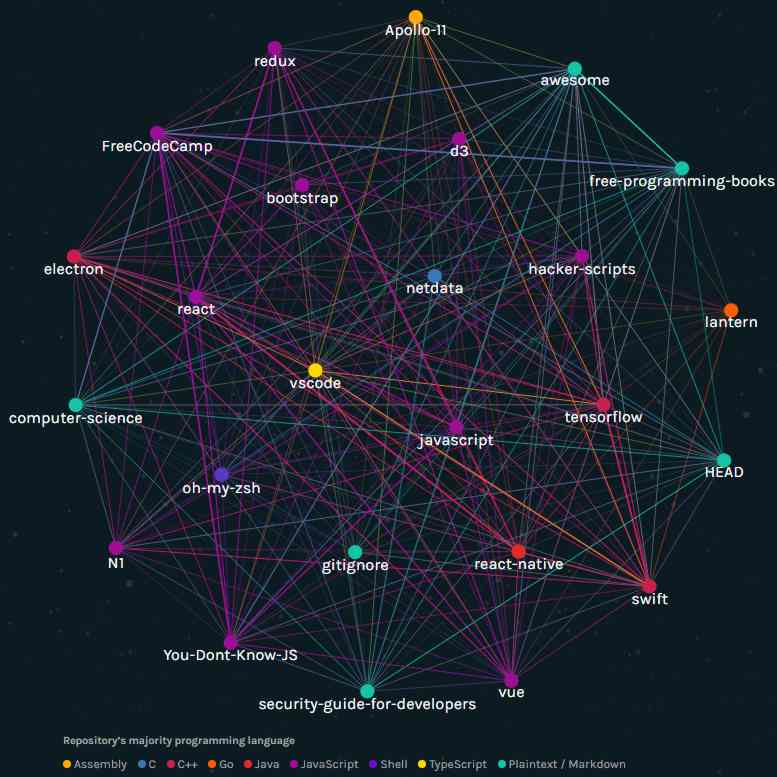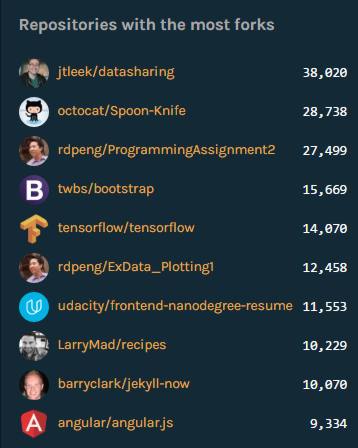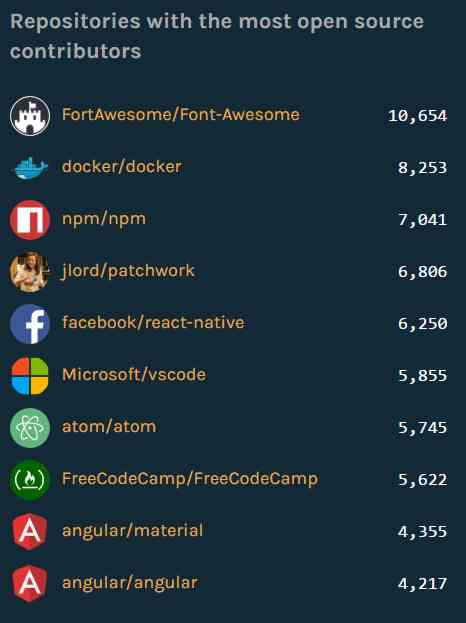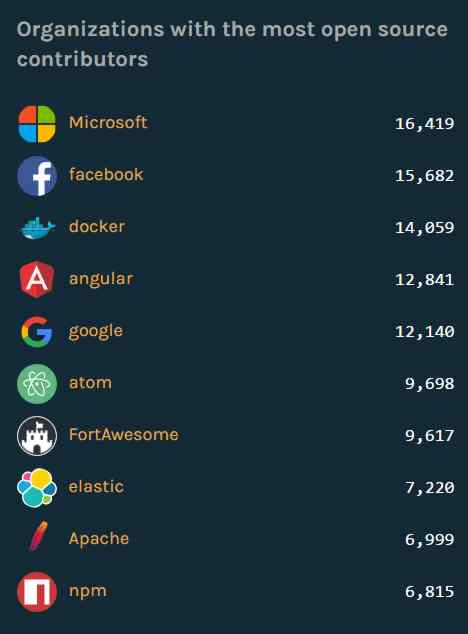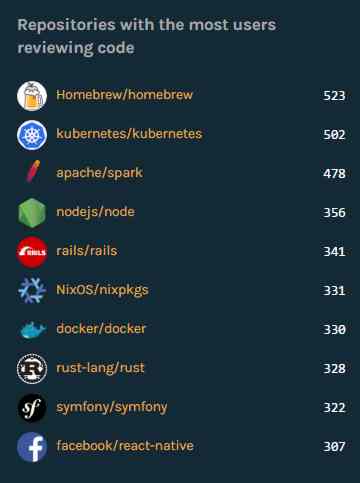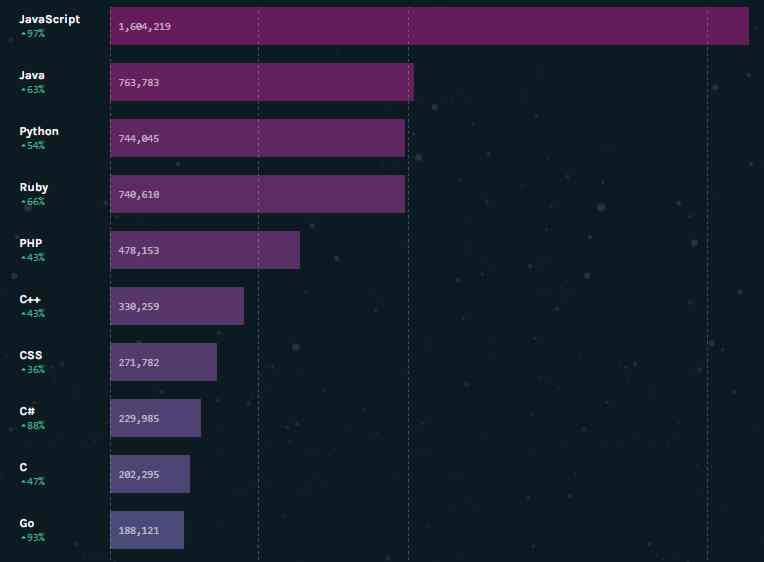| GitHub Octoverse Reveals The State Of Open Source |
| Written by Lucy Black | |||
| Wednesday, 28 September 2016 | |||
|
Ahead of its annual conference earlier this month, GitHub published a fascinating report. The fact that attracted most attention is that Microsoft is the organization with the most open source contributors. What else does it tell us? The first thing to notice about GitHub is its sheer scale. As far as public repositories are concerned, over the last 12 months there were over 19.4 million active repositories and over 10.7 active issues involving over 5.8 million active users and almost a third of a million active organizations on GitHub, where "active" means code committed, a comment created, a repository starred, or an issue opened. If you want to know what has been popular on Github in the past 12 months this graph shows the most starred open source repos, showing which repos users starred in common.r Most of these repos will be familiar to I Programmer readers - see our articles on VSCode, open Electron, React Native among others. Not all the projects in the graph are code repositories. There are also educational resources such as the Open Source Society's curriculum for studying computer science (see OSS University - A Free Computer Science Degree Curriculum) and FreeCodeCamp an initiative that, as explained in our review, helps you learn how to code by working though self-paced coding challenges and building projects. We've also reviewed one of the books in the You-Don't-Know-JS series.
If you are surprised by the mix of projects among the most starred repos the most forked ones also reveal how GitHub is being used apart being a code repository. Top of the list of is The Leek group guide to data sharing withover 38K forks in the past year (over 160K forks over its entire existence). Second in the list with over 28.7K forks) is Spoon-Knife, the octocat guide to forking - so it's rather surprising that it doesn't come top of the list. Next in the list with 27.5K forks is a programming assignment for a Coursera MOOC on R. An assignment for another Coursera class by the same instructor is number 6 on the list (12.5K forks) and after that comes a Udacity resource - resume for the FrontEnd web developer Nanodegree. Next in the list is a repository for recipes - no not programming, but foods that are liked by its initiator. This isn't any longer a active repo but that doesn't stop it being forked. Similarly the jekyll-now project, which can be cloned to create a Jekyll blog isn't frequently updated but it is frequently consumed (over 10K forks). Tensorflow, the neural network tool which Google open sourced last November has had over 14K forks, putting it on a par with bootstrap, a HTML, CSS, and JavaScript framework for developing mobile first projects on the web and well ahead of Angular.js, which has had over 9.3K forks in the past year and 25.8K overs its history. Angular, which appears last in the top 10 most forked repositories appears again in both Repositories with the most open source contributors and Organizations with the most open source contributors and if you sum together it contributors its obviously very well supported.
As widely reported Microsoft is currently top of the latter chart, where with 16.4K contributors it beats Facebook which has 15.6K. As far as open source contributors are concerned Facebook's React Native has rather more open source contributors (6.25K) than Microsoft's VS Code (5.85K). While the numbers of users who review code is a smaller order of magnitude it is still an informative measure of support for open source projects and Kubernetes, Apache Spark, Node.js, Rails, Docker and Rust included in this league table is encouraging.
Finally it is interesting to see the languages that have been trending on GitHub. It isn't surprising that JavaScript is top of the list - but the degree to which it outstrips its nearest rivals (Java, Python and Ruby) perhaps is.
Looking back at the most starred repos, there's a lot of JavaScript's purple circles, while green for plain text and markdown language are also numerous. The surprise in that graph is the single gold circle denoting Assembly, the language used for the Apollo 11code, which attracted a lot of attention when it was open sourced by MIT a couple of months ago. So the GitHub Octoverse is a muti-faceted place to visit. It has a thriving and expanding community and seems like a great location for projects both great and small. More InformationThe State of the Octoverse 2016 Related ArticlesGitHub Platform and Community Improvements To be informed about new articles on I Programmer, sign up for our weekly newsletter, subscribe to the RSS feed and follow us on Twitter, Facebook or Linkedin.
Comments
or email your comment to: comments@i-programmer.info
|
|||
| Last Updated ( Wednesday, 09 November 2022 ) |


